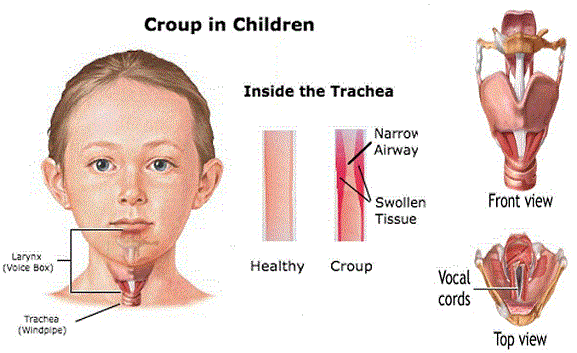COVID-19 News: Chicago Physicians Report First Case Of Laryngotracheitis (Croup) Caused By SARS-CoV-2 In Boy Aged 1 Year 2 Months
Source: COVID-19 News Dec 21, 2020 4 years, 4 months, 5 days, 9 hours, 24 minutes ago
COVID-19 News: Physicians from the Department of Pediatrics, Rush University Medical Center, Chicago- Illinois report a case the first documented case so far of a 14 month year old boy contracting Laryngotracheitis (Croup) as a result of the SARS-CoV-2 coronavirus infection.

Laryngotracheobronchitis, commonly called as Croup, also known as is a type of respiratory infection that is usually caused by a virus. The infection leads to swelling inside the trachea, which interferes with normal breathing and produces the classic symptoms of "barking/brassy" cough, stridor, and a hoarse voice.Fever and runny nose may also be present. These symptoms may be mild, moderate, or severe. Often it starts or is worse at night and normally lasts one to two days
Croup is a common childhood syndrome involving subglottic inflammation. This is a viral illness most often secondary to human parainfluenza viruses, but it is also associated with respiratory syncytial virus, rhinovirus, enterovirus, and others.
Hence croup is typically seen in the late fall and early winter seasons, and patients usually have associated viral symptoms, such as rhinorrhea and nasal congestion. The diagnosis of croup is clinical. On physical examination, patients have inspiratory stridor, which may occur at rest or only while crying. A thorough physical examination and sometimes imaging will help exclude diagnoses, such as epiglottitis or retropharyngeal abscess. The severity of croup relates to the child’s degree of respiratory status and work of breathing. Although not necessary to diagnose croup, a neck radiograph may reveal subglottic narrowing or “steeple sign." A chest radiograph can also help exclude an aspirated foreign body. Viral croup is a self-limited illness that typically resolves over several days.
The SARS-CoV-2 has been shown to be a multifaceted pathogen. Most pediatric patients with confirmed cases present asymptomatically or with mild upper respiratory symptoms, but a small percentage can progress to acute respiratory distress syndrome or multiorgan system dysfunction. There are no known documented cases of SARS-CoV-2 causing croup in the pediatric population. The study team reports the first documented case of a 14-month-old boy with classic symptomatology and radiographic confirmation of croup who was subsequently found to have COVID-19 infection.
The case report was published in the peer reviewed journal: Pediatrics (The Official Journal of The American Academy of Pediatrics.
https://pediatrics.aappublications.org/content/early/2020/12/15/peds.2020-012179
The study team reported that the 14-month-old boy was presented to a community emergency department with fever, cough and stridor, and did not have pneumonia or lower-respiratory-tract infection.
Dr Claire E. Pitstick, a pediatrician at Rush University Medical Center in Chicago told Thailand Medical News, "My take-home message is to always keep COVID on the differential diagnosis, because it can present in so many different ways."
She added, "This is why it is so impo
rtant for hospital administrators to have adequate PPE and for clinics to have access to sufficient SARS-CoV-2 testing, ideally rapid point-of-care testing. In our patient, the diagnosis of COVID did not change the way we treated the croup itself, but we were able to educate the family on self-isolation to prevent transmission."
The young male patient presented to the emergency department in early May 2020 with difficulty breathing and a fever of 39.3 C.
The boy was also tachycardic initially, with blood pressure of 103/85 mm Hg and respiratory rate of 40 breaths per minute. His oxygen saturation was 100% while breathing room air
The patient was treated at the emergency department with racemic epinephrine and dexamethasone and transferred to the authors' quaternary-care center to be observed overnight. He was discharged the next day with supportive care and outpatient follow-up.
It was said that the parents had not vaccinated the boy for religious reasons.
Although being unvaccinated was unlikely to be a factor in him contracting COVID croup, "the influenza vaccine may have prevented our patient from being hospitalized for influenza A in February 2020, added Dr Pitstick.
Dr Pitstick added, "Before discharging our patient, I strongly encouraged the father to schedule catchup vaccines with their pediatrician. He said he would consider it, because he had seen how dangerous respiratory illnesses can be, and he did not want his son to be hospitalized again."
She added, "Luckily, our patient recovered quickly from croup without short-term complications. However, since his outpatient pediatrician is not connected to Rush, we were unable to follow up on whether he seroconverted (produced COVID antibodies) or developed any long-term complications.”
The study team concluded, “We recommend that when a child is diagnosed with COVID - inpatient or outpatient, symptomatic or asymptomatic, it should be added to their medical history in order to monitor for secondary effects, such as multi-system inflammatory syndrome in children (MIS-C) and other long-term outcomes. SARS-CoV-2 has thus been shown to cause a wide array of clinical presentations and severity of disease. Our case represents a new presentation of COVID-19 in pediatric patients."
For the latest
COVID-19 News, keep on logging to Thailand Medical News.
